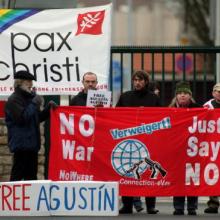Conscientious Objection
CONSCIENCE, REMARKED MORAL theologian Richard Gula, “is another word like ‘sin’—often used but little understood.”
As a teenager growing up in the naval stronghold of San Diego during the Reagan era, I experienced a recurring nightmare about war with the Soviet Union, which became darker as I learned more about the U.S. atomic bombings of Hiroshima and Nagasaki, which took place 75 years ago this August. During that time Joan Kroc, an anti-nuclear leader who was also principal owner of the San Diego Padres baseball team, and others organized Mothers Embracing Nuclear Disarmament. On the 40th anniversary of the Hiroshima and Nagasaki bombings, thousands gathered in Balboa Park, and my fear was transformed into a conviction of conscience to work for nuclear disarmament.
Conscience involves the capacity to discern and choose the morally right course of action in a particular situation. In doing so, a person brings to bear a lifelong process of formation of conscience. Each person has the obligation to form his or her conscience as fully as possible, and to follow it.
The formation of conscience is highly personal and socially situated. Hebrew and Christian scriptures, as well as theological writings such as those by St. Augustine, provide steps for building moral character, teaching moral reasoning, and forming our moral conscience to offer judgment based in practical reason to recognize and seek what is good and to reject what is evil.
This process for engaging Christian moral thinking involves four key elements:
- Be open to the truth and draw upon the prudent wisdom of personal and communal experience.
- Seek reliable teaching, including from scripture and Christian tradition.
- Review the best available information and consult trusted persons with relevant expertise.
- Engage prayerful discernment and conscientious action through the gift of the Holy Spirit to guide one’s application of moral values in each case.
WHEN I FOUND out years ago that most early Pentecostal denominations had been committed to nonviolence—including the Assemblies of God, the denomination of my heritage—I thought it was about the dumbest thing I’d ever heard. Not kill for the United States of America (or any country)?
Then I stumbled upon the Pentecostal Evangel, a weekly magazine of the Assemblies of God (USA), which published these revealing words during World War I:
From the very beginning the [Pentecostal] movement has been characterized by Quaker principles. The laws of the Kingdom, laid down by our elder brother, Jesus Christ, in the Sermon on the Mount, have been unqualifiedly adopted, consequently the movement has found itself opposed to the spilling of the blood of any man.
This was new to me. I was reared in a U.S. Pentecostalism that taught intense loyalty to the United States and deep pride in combatant military service. Where did this hidden history of Pentecostal nonviolence come from?
Reading other early accounts of Pentecostal peacemaking prompted me to further examine where it had gone and whether it could re-emerge. It would also challenge and deconstruct my understanding of Christianity.
A senior Vatican official on Tuesday (April 17) called for stronger protection for conscientious objection for both the Catholic Church and individual Catholics when they are faced with laws that conflict with their “moral norms.”
Speaking at Italy's Catholic University in Milan, Cardinal Giovanni Lajolo, former governor of the Vatican City State, waded into the fight between the U.S. Conference of Catholic Bishops and the Obama administration over mandatory insurance coverage for contraception, saying the mandate raises "serious problems of conscience” for Catholic institutions and citizens.
One of the U.S. Constitution's difficult balances is found in the freedom of religion clause of the First Amendment:
“Congress shall make no law respecting an establishment of religion, or prohibiting the free exercise thereof …”
What happens when those two values conflict?
That is the issue with the controversy over whether religiously-affiliated organizations should be required to offer free coverage for contraception in health insurance plans made available to employees. Those opposed — most notably Catholic organizations — claim that this requirement would violate their freedom of conscience. Those who support it claim that exempting religiously-affiliated organizations would establish a religion over the rights of individuals.
A former Army intelligence analyst in Iraq talks about Bradley Manning, the weight of conscience, and the witness of St. Paul.
This series written by Logan Mehl-Laituri for God's Politics focuses on selective conscientious objection. Read more posts in this series here.
This is the second installment of a series Logan Mehl-Laituri is writing for God's Politics focusing on selective conscientious objection. Read his first installment here.
Last March I testified at the Truth Commission on Conscience in War (TCCW) at the Riverside Church in New York City.
Before I went to Iraq with my friend and fellow God's Politics contributor Shane Claiborne, I was trying to figure out how to take the lessons I would learn there back home. I felt certain (and now know) that the experience could be a small but powerful step toward improving our understanding of how to prevent any future indiscriminate uses of force similar to the invasion and occupation of Iraq.
Life is easier in black and white, when things are clearly right or clearly wrong. We tend not to like the gray very much. It was certainly easier for me to hard-headedly disapprove of all war, including those who took part in it. But, working at an orphanage in India, I met Chad, a young man fresh from Iraq with an American flag tattoo, and he muddled up my clarity.



